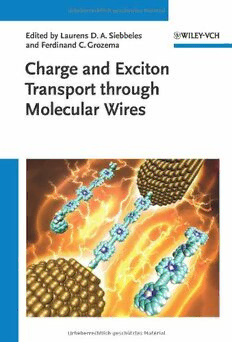
Charge and Exciton Transport through Molecular Wires PDF
323 Pages·2011·37.773 MB·English
Most books are stored in the elastic cloud where traffic is expensive. For this reason, we have a limit on daily download.
Preview Charge and Exciton Transport through Molecular Wires
Description:
As functional elements in opto-electronic devices approach the singlemolecule limit, conducting organic molecular wires are the appropriateinterconnects that enable transport of charges and charge-like particles such as excitons within the device. Reproducible syntheses and athorough understanding of the underlying principles are therefore indispensable for applications like even smaller transistors, molecularmachines and light-harvesting materials. Bringing together experiment and theory to enable applications in real-life devices, this handbookand ready reference provides essential information on how to control and direct charge transport. Readers can therefore obtain a balancedview of charge and exciton transport, covering characterization techniques such as spectroscopy and current measurements together with quantitative models. Researchers are thus able to improve the performance of newly developed devices, while an additional overview of synthesis methods highlights ways of producing different organic wires. Written with the following market in mind: chemists, molecularphysicists, materials scientists and electrical engineers.
See more
The list of books you might like
Most books are stored in the elastic cloud where traffic is expensive. For this reason, we have a limit on daily download.
